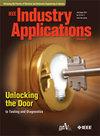A Linear Machine Learning-Based Model Predictive Control With Repetitive and PI Elements for a Three-Phase Inverter
IF 4.5
2区 工程技术
Q2 ENGINEERING, ELECTRICAL & ELECTRONIC
引用次数: 0
Abstract
Existing machine learning (ML) based model predictive control (MPC) methods are either inferior to the online optimized with quadratic programming (QP) MPC or have high computational complexity and cannot be implemented in the resource-limited digital signal processor (DSP). This paper solves these two issues by using linear ML methods and adding extra interpretable features. First, the intrinsic linearity of the training data generated by the QP-MPC has been theoretically proved such that the linear ML methods, e.g., linear neural network (LNN) and linear support vector regression (LSVR), can be used to capture the linearity characteristics of the training dataset. The linear operation significantly reduces the computational complexity from基于线性机器学习的三相逆变器重复与PI元模型预测控制
现有的基于机器学习(ML)的模型预测控制(MPC)方法要么不如用二次规划(QP)在线优化的模型预测控制(MPC)方法,要么计算量大,无法在资源有限的数字信号处理器(DSP)中实现。本文通过使用线性机器学习方法和增加额外的可解释特征来解决这两个问题。首先,从理论上证明了QP-MPC生成的训练数据的内在线性,因此可以使用线性机器学习方法,例如线性神经网络(LNN)和线性支持向量回归(LSVR)来捕获训练数据集的线性特征。线性运算显著地将计算复杂度从0 (2n)降低到0(1),从而可以在DSP中实现。其次,将具有重复和比例积分(RPI)元素的额外特征添加到基于线性ml的mpc中。分别在线性和非线性载荷条件下,对QP-MPC、LNN-MPC和LSVR-MPC与RPI元件进行了实验研究。结果表明,基于线性ml的mpc在电能质量和跟踪误差方面优于QP-MPC。此外,在参数失配和二自由度(2DOF)控制下,基于线性ml的mpc优于QP-MPC,证明了其自适应能力。本文附有演示实时操作的视频。
本文章由计算机程序翻译,如有差异,请以英文原文为准。
求助全文
约1分钟内获得全文
求助全文
来源期刊

IEEE Transactions on Industry Applications
工程技术-工程:电子与电气
CiteScore
9.90
自引率
9.10%
发文量
747
审稿时长
3.3 months
期刊介绍:
The scope of the IEEE Transactions on Industry Applications includes all scope items of the IEEE Industry Applications Society, that is, the advancement of the theory and practice of electrical and electronic engineering in the development, design, manufacture, and application of electrical systems, apparatus, devices, and controls to the processes and equipment of industry and commerce; the promotion of safe, reliable, and economic installations; industry leadership in energy conservation and environmental, health, and safety issues; the creation of voluntary engineering standards and recommended practices; and the professional development of its membership.
 求助内容:
求助内容: 应助结果提醒方式:
应助结果提醒方式:


